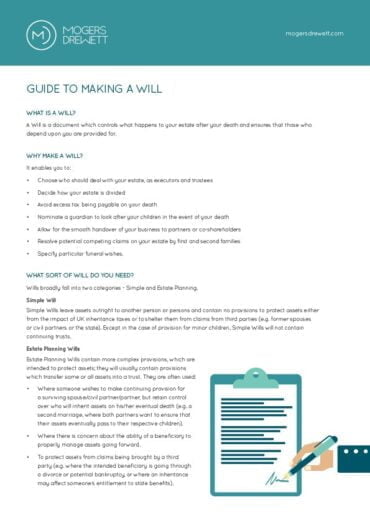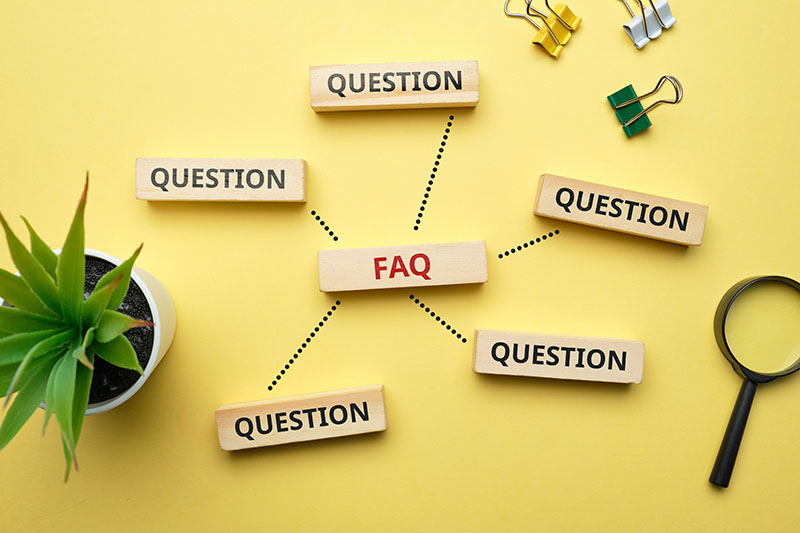Get vital support for making a Will
Only by making a Will can you make sure that your wishes will be carried out just the way you want after your death. You can decide who you would like your assets to go to, avoiding any arguments over inheritance, and the process can be carried out in the most tax-efficient way possible.
If you don’t make a Will, the law will be in charge of dividing up your estate according to the rules of intestacy. These rules are very strict and might not reflect how you would like your home, money or possessions to be distributed after your death. Your loved ones might also miss out on the most tax-efficient way of dividing your estate.
Our team of Will experts can help you draft a document that:
- Minimises your tax liability by ensuring you take full advantage of tax exemptions, allowances and reliefs
- Protects your wealth for future generations
- Arranges gifts to members of your family
- Prepares for the future by putting guardianships and trusts in place for children
- Ensures your business can continue without you
- Supports charities that are important to you
Although making a Will can be an emotional and difficult process, putting a Will in place will give you the peace of mind knowing that your wishes will be fulfilled, your assets will go to the right people and that loved ones won’t have to take on any unnecessary tax burdens.
Next steps: get in touch
If you need legal advice to put your Will in place or review your existing Will to ensure it still reflects your wishes, contact our team of experts on: 0800 533 5349 or enquiries@mogersdrewett.com
Meet the team
Frequently asked questions
If you have made a Will, when you die your estate will be divided according to the wishes you have recorded in the document. Your wealth and possessions will be distributed just the way you wanted and in a tax-efficient way. If you die without making a Will, your estate will be divided up according to what is known as the rules of ‘intestacy’.
When someone dies without making a Will, they are said to have died intestate. The estate is then divided according to the rules of intestacy. Loved ones can be faced with a lengthy administrative process at an already difficult time, which can lead to disputes between family members over what you may have wanted.
Yes. As long as the Will is properly signed and witnessed by two adult independent witnesses who are present at the time of signature, it should be legally binding.
Executors are appointed in the Will and are legally responsible for carrying out the wishes of the person who made the Will. They will collect in the estate and distribute it to the beneficiaries (those named in the Will), and ensure any debts are paid.
No, it is not necessary to register a Will. It is still legally valid after your death, as long as it was properly signed and witnessed by two adult independent witnesses present at the time of signature.
You do have the option of creating your own Will and it is usually cheaper. But there are many benefits of getting an expert to draw up your Will. A solicitor will ensure that you are aware of all the options open to you, that your Will is tax efficient and most importantly accurate. Any unclear statements or errors could create more stress for your loved ones, and potentially cost them time and money while they try to work out what you meant.
We recommend checking your Will every five or so years to make sure it still sets out what you’d like to happen to your estate after your death. If there’s any significant update in your circumstances, such as getting married, divorced or having children, you should review your Will again.
The specifics of your Will document will depend on your individual circumstances. If you have remarried and have a second family, or if you’re a business owner, the process will be more complex, but it’s still worth doing. Start off simply by making a list of all your major assets, how much they’re worth and who you would like to inherit them. Then speak to an expert about putting those wishes in writing in the form of a Will.
In England and Wales, you can leave your estate to whoever you choose. While there are many reasons for wanting to leave someone out of your Will, doing so can increase the risk of a claim being made against the estate after your death. If you’d like to go ahead and exclude someone from your Will, get some professional advice first.
Yes. If you have children under the age of 18, you should consider appointing a guardian for them in your Will. A guardian is a person you can designate to look after your children and make decisions on their behalf if you were unable to do so.
If you die intestate while legally married, your spouse or civil partner will receive a portion of your estate (currently the first £250,000 if you have children, and £450,000 if you do not, as well as half of anything above the value of that amount, as well as your personal belongings). This will be the same even if you are separated from your spouse or civil partner, unless you have already processed your divorce or dissolution of your civil partnership.
The rest of your estate will be divided between any children, grandchildren or great grandchildren you have (only includes biological or legally adopted children, not step children). If you don’t have any descendants to pass on your estate to, it will go to other living family members.
If you don’t have any immediate family, the administrators of your estate will be required by law to try and locate any distant relatives to pass your estate on to. This can be very expensive and can take a lot of the value out of your estate. If there are no potential beneficiaries, your estate will pass to the Crown.
Yes, in certain circumstances. If you’re a financial dependant, a cohabiting partner or a step child of the deceased, you can make a claim under the Inheritance (Provision for Family and Dependants) Act 1975. Find out more about our contentious probate service










